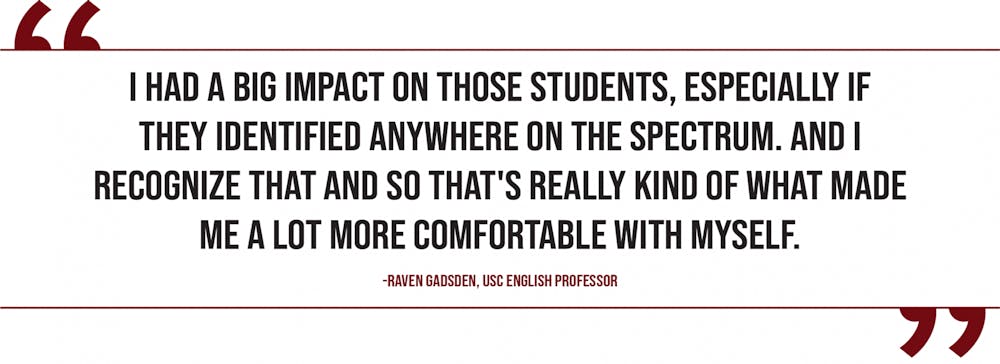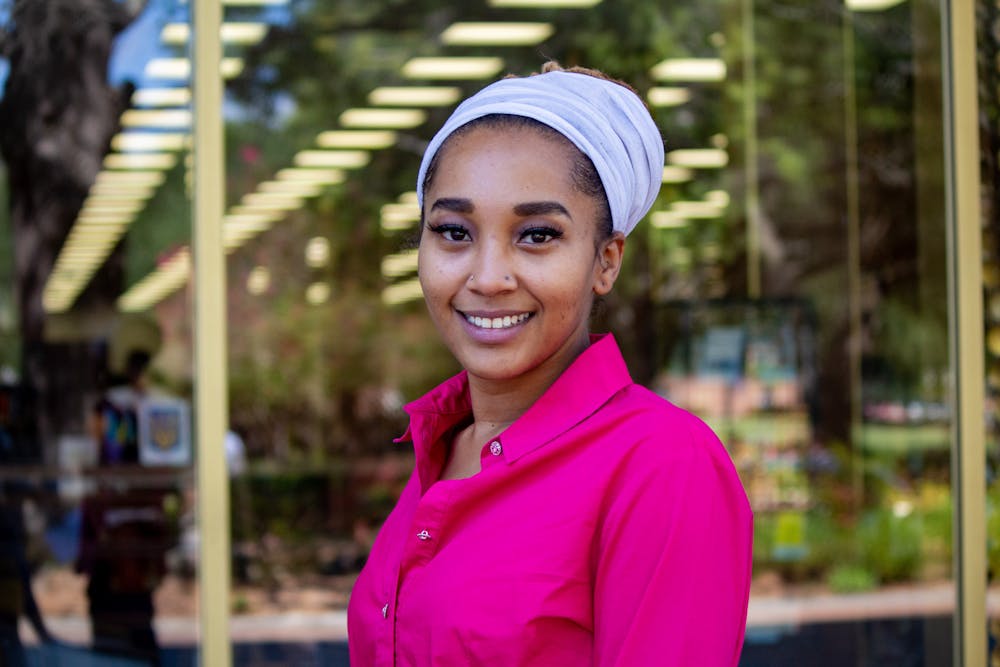USC English professor Raven Gadsden was marked down during a previous teaching internship because her instructor saw her then-girlfriend walking with Gadsden into the school.
“I wish that she had spoken to me. What she did was she wrote it up, and then she sent it to the mentor before I even had a chance to see it. And so, I felt very blindsided,” Gadsden said. “It made me feel yucky on the inside.”
The Daily Gamecock spoke with Gadsden on how she became more open as a bisexual woman and how she has impacted her students in the classroom by offering the perspective of someone who is Black and identifies with the LGBTQIA+ community.
How did you become more comfortable with your sexuality?
“(I started) building a small little tribe of students, and they ended up starting a club, which ended up being the LGBT club at the high school, and I ended up being their advisor … I realized in that year that I was teaching with those students how much of an influence I had, because I was the first — for a lot of them — gay teacher that they had, male, female or otherwise."
“And so that kind of put me in a position where it was, ‘If this is who I am, I need to kind of be who I am because I don't know what kind of experience my students are going to end up having.'"
“So, in the short time that I was at that high school, I had a couple of students came out, I had one student who was transgender and like, started to, I guess, become more comfortable in his process."
“I had a big impact on those students, especially if they identified anywhere on the spectrum. And I recognize that and so that's really kind of what made me a lot more comfortable with myself.”

How important is that student-teacher relationship?
“I think that that is extremely important. I think, no matter what, like background, a teacher comes from, they have a lot that they can offer their students. And I think sometimes the professors that we encounter, if they haven't been trained as educators … you don’t realize you can still make those connections in the classroom, and you can still offer whatever it is you have to offer."
“So outside of my sexuality, I am also a woman, so I also offer that perspective. I’m a person of color, so I also offer that perspective."
“When I was teaching at Winthrop — and everywhere I go too — if I have Black students in the class, I noticed that even if they're struggling, even if they don't get the concept, they might show up to class the entire semester. They might fail the class by the end of it, but they show up, and they show up because they see somebody like them who is comfortable being themself.”
How does it feel to be that person who can provide support in that way?
“It feels good, but I recognize that I have limits. And so if anytime over the years students have shared things with me that I felt like I couldn't handle, I always either referred them out or I tried to get them some kind of service outside of myself."
“Recognizing that I can't fix everything has also been a really big help to my students, because I'll tell them, ‘I can't help you with that.’ And they appreciate the honesty."
“So I recognize, you lie to a student you tell them, ‘Okay, I'm going to do this, this date,’ you’re in the same category as other people in their life — over the course of their life — who have not kept their word. So I try to, as an educator, in anything that I’m doing, to keep my word.”
Should USC offer more classes that center around LGBTQIA+ themes or topics?
“I think that that’s probably a good idea, there’s room, and I know within the first-year English for professors to design courses, themed courses, around whatever theme they want.”
“I know in history classes, I would love to have taken a history class that was from the perspective of LGBT because a lot of the things that I learned I had to learn on my own."
"I didn't learn them from school, like in terms of some of the riots like the (Stonewall Riots) and some of these people who were key — not just key figures in terms of like pop culture or terms of drag icons or whatever the case is — but key people who ended up changing laws and legislation. And we don't get taught that in school because they were gay, because they were LGBT.”

